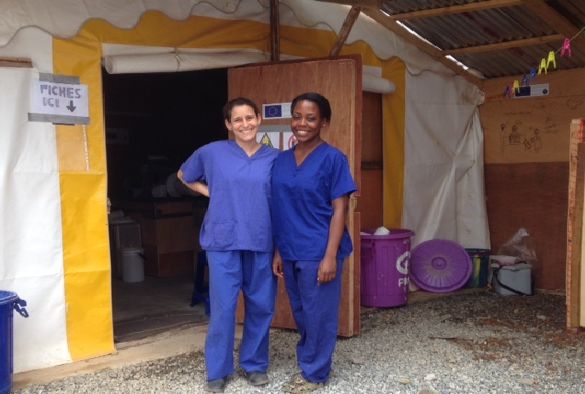
PhD students, Isabel Garcia-Dorival and Elsa-Gayle Zekeng, from the Julian Hiscox laboratory, are currently deployed in Guinea and are pictured outside the European Mobile Laboratory.
Research at the University of Liverpool’s Institute of Infection and Global Health has shown that the evolution of Ebola virus is unlikely to impact on the effectiveness of current treatments.
Over the past year, the Ebola virus outbreak in West Africa has progressed amongst concerns about the speed the virus could evolve and the impact this could have on vaccines, diagnostics and treatment.
The Liverpool team, in collaboration with Public Health England, the University of Bristol and other international teams, used blood samples taken from patients and compared changes in the genetic material of the virus throughout the outbreak.
Single origin
They were able to show that the outbreak had a single point of origin and predicted that diagnostics and treatment would be effective on the current form of the virus.
Professor Julian Hiscox, who led the Liverpool component of the study, from the University’s Institute of Infection and Global Health, explains: ‘”We have been building this capability over the past few years and have been able to study the virus and provide detailed information on potential genetic change that can be used to inform policy in this and future outbreaks.”
Professor Miles Carroll, the study lead, and Director of Research at Public Health England at Porton Down, said: “I have witnessed first-hand the devastating social and economic impact this disease has inflicted on the West African region. It is a relief to understand that the true genetic changes of the virus should enable the new vaccines and treatments to be effective.”
Horizon 2020
The genetic fingerprinting of the virus was performed by several scientists at Liverpool including, Dr Georgios Pollakis, Isabel Garcia-Dorival and Natasha Rickett at the Institute of Infection and Global Health, and Dr John Kenny from the Centre for Genomic Research.
The study was supported by a €1.7 million grant, part of EVIDENT, the research arm of the European Mobile Laboratory, awarded by the European Union’s Research and Innovation Programme, HORIZON 2020.
The study entitled, ‘Temporal and spatial analysis of the 2014–2015 Ebola virus outbreak in West Africa’ is published in the journal Nature.
